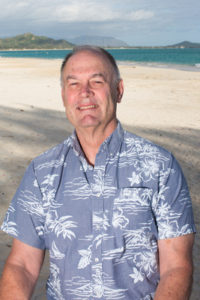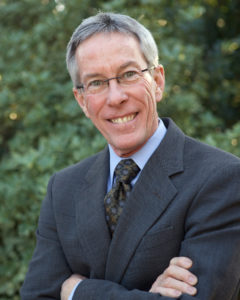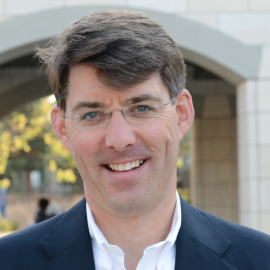In the 53 years since Jeffress “Jeff” Williams graduated from Allegheny College, he’s spent an inordinate amount of time on the beach.
It’s not what you might think. He hasn’t been biding his time sunbathing and bodysurfing. He’s been performing potential planet-saving research for the United States Geological Survey.

Williams retired from the USGS in 2010 and is now senior scientist emeritus based at the Woods Hole Science Center in Massachusetts. He is recognized as a national and international expert in coastal and marine geology. “I continue to do research in coastal topics, write journal papers, give scientific and public lectures, and advise students,” he said recently from his home in North Falmouth, Massachusetts.
During his career, Williams has led more than 80 field studies along the coasts of the Atlantic Ocean, Pacific Ocean, Gulf of Mexico, Great Lakes, and the Irish Sea in the United Kingdom. He has co-authored more than 385 scientific articles, contributed to eight books, served on more than a dozen high-level national and state science committees, and made more-than-he-can-count technical presentations on ecosystem-management strategic plans.
“I have found that nearly all coastal and marine areas where I have worked are interesting and have something new, unique and scientifically interesting about them,” said Williams. “The geology of each region is different depending on its origins, age and how it’s evolved over time. The geologic character of each locale determines the ecology associated with it and the animals living there.”
Williams spent the better part of his career working from the USGS headquarters in Reston, Virginia, but spent much of that time on the road — or on the beach. He also conducted research for six months at a research center in Taunton, England, studying the Irish Sea. In 2000, he accepted a research position at Woods Hole, moving to Cape Cod, where he currently resides with his wife, Rebecca. (He spends winters in Hawaii, where his son and his family live.)
He says that no one expedition stands out as extraordinary in his mind, but Williams does cite his accumulated knowledge from his geological work as important to share. “My research over the past four decades on how Earth’s climate over the past several thousand years has changed resulting in the rise and fall of global sea levels on the order of hundreds of feet has improved our understanding of why and how global warming and climate change is occurring presently and aids in predicting what environmental conditions are likely for the next several decades to centuries,” he said. “Changes in all these conditions due to climate warming and disruption will have huge impacts on Earth’s ecosystems and especially human populations across the globe.”
Throughout his career, Williams has appeared on numerous talk shows, in public forums and in courtrooms as an expert in coastal geology and climate change. He also testified before the U.S. Congress regarding the impact of Hurricane Katrina in 2005 on the Louisiana delta plain coast.
Williams worked for six years with a major land trust in Louisiana assessing the many environmental impacts from the BP oil spill (Deep Horizons) in 2010 on barrier islands and wetlands along the Gulf Coast. “Working with other scientists and attorneys, our studies resulted in a significant settlement against BP for environmental damage to natural resources,” he said.
As for career highlights, Williams does not single out any event or achievement. Rather, he says, “two highlights come to mind: being able to provide answers and solutions to issues facing citizens and public policy based on geologic research and studies that I and other colleagues have undertaken. And, the satisfaction I get when I advise students of all ages in navigating life’s decisions and making career decisions and the vital importance of a well-rounded education throughout their lives.”
Williams visits Allegheny College on occasion; he was on campus eight years ago to deliver a geology lecture. He credits his four years at Allegheny as a student for giving him a solid foundation for a career in geology and for “a satisfying life. My course work in geology and science were key but also other liberal arts courses such as history, art and political science helped me to become a more rounded person and better citizen,” he said.
Bob Schwartz, professor emeritus of geology at Allegheny, has remained in contact with Williams since their days together as geology majors in College. “As an undergraduate, Jeff had a remarkable passion for geology and a very strong work ethic,” said Schwartz. “I view Jeff’s extensive work along the Louisiana coast, including predictions of regional hazards like those later suffered by the New Orleans region in Hurricanes Katrina and Rita, as being seminal to our modern global-scale understanding of coastal problems having to do with climate change, storm occurrence and sea-level rise. His continued presentation of scientific findings in a clear and effective manner to help protect and remediate the Earth’s well-being exemplifies the liberal arts ideology.”
Two environmental issues stand out for Williams as especially important.
As a USGS sand commodity expert for 25 years, Williams has noticed that sand, as a resource, is disappearing, and that’s not a good thing because sand is critical in a variety of industries, including making concrete, electronic components, glass making and, of course, for maintaining beaches and protective coastal dunes. “Quartz is the most common mineral on Earth; however, the irony is that good quality quartz sand is in short supply worldwide as a resource,” he said.
Usable sand deposits are limited, often far from markets and mining creates environmental issues, said Williams. “In some regions, sand has been mined from beaches and dunes for construction resulting in damage to these landforms,” he said. Now, sand is being mined on the seafloor and transported sometimes thousands of miles to repair eroded beaches and dunes, Williams said.
Williams also has a very clear position in the ongoing debate over global warming.
“Climate change is as real and factually supported as other well-established theories, such as biological evolution, plate tectonics, gravitational attraction and a round, versus flat, Earth and, as such, needs to be recognized as an emergency situation for the world,” Williams said. “Addressing the reality of climate change and the need for reaching zero carbon emissions in the next two decades should be a top priority for the United States and all nations.
“The time for action is past due,” he said. “Carbon emissions need to be reduced to zero by alternative energy technologies within the next two decades, and technology advances and a massive tree-planting effort are needed to actually remove carbon from the air.”
In fall 2019, Williams was honored when part of the Two Ponds Accessible Trail in Falmouth was named the Jeffress Williams Pathway. The trail encompasses a white cedar swamp and kettle-hole pond that are part of a larger protected space. It is also near a senior residence facility and is likely to be popular among walkers of all abilities, especially school classes on science and nature walks, which is particularly pleasing to Williams.
“I’ve supported open space protection in Falmouth, including the Two Ponds project over the past several years,” said Williams, “and having muscular sclerosis and no longer able to hike, I appreciate the fact that this and several other areas are accessible for wheelchairs and walkers. I’m deeply honored for the trail system.”

